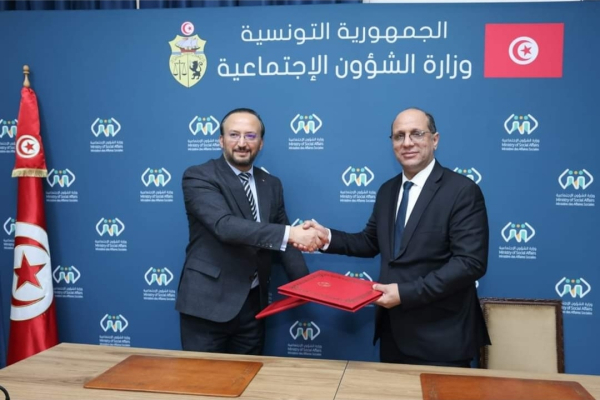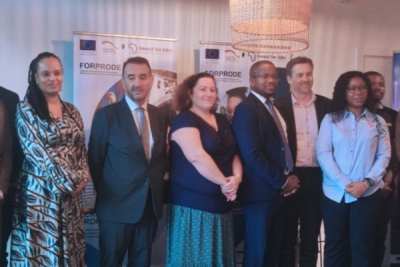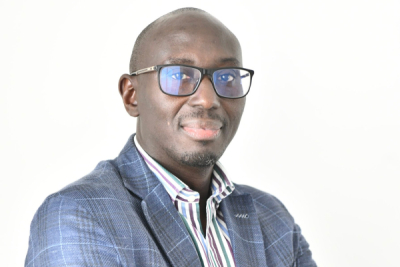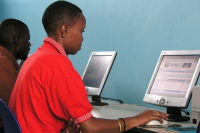
Tech (808)
In line with its digital transformation strategy, Tunisia is set to digitize all citizen services, encompassing even social services. This move is part of the country's broader initiative to dematerialize services.
Tunisia's Minister of Social Affairs, Malek Ezzahi, and Minister of Communication Technologies, Nizar Ben Neji, have inked a cooperation agreement aimed at digitizing access to social services. The agreement, signed in Tunis on January 10, is part of a broader initiative to simplify administrative procedures and enhance services for citizens and businesses alike.
The Ministry of Social Affairs, in a press release, detailed the agreement's provisions, which include the adoption of electronic signatures for online administrative procedures, digital identity, and non-material data exchange. The agreement also facilitates access to the Ministry's sectoral platforms via the citizen portal and introduces citizen mail for detailed notifications, thereby improving communication between the administration and citizens.
The initiative falls under the national digital transformation strategy, set for implementation through 2025. It specifically targets entities under the Ministry of Social Affairs' purview, including the national social security fund, the national pension and social welfare fund, the national health insurance fund, the office for Tunisians abroad, and the general committees for social promotion and labor and professional relations.
To realize the agreement's objectives, the Ministry of Communication Technologies will collaborate with the National Information Center, the National Agency for Electronic Authentication, the National Agency for Cybersecurity, and the Tunisian Post Office.
Plans are also underway to streamline the distribution process for "Labes" and "Aman" healthcare cards. These cards, which will replace paper health insurance booklets and healthcare booklets for low-income individuals, will be used to pay for health services and purchase medicines.
Samira Njoya
Internet access restrictions have increasingly become a norm in Africa in recent years. A variety of factors contribute to the intentional suspension of the Internet, including limitations on information access, armed conflicts, and coups d'état among others.
In 2023, network outages impacted 84.8 million Internet users in sub-Saharan Africa. These disruptions, which lasted for 30,785 hours, resulted in estimated economic losses of $1.74 billion.
The region ranks second after Europe ($4.02 billion), surpassing Asia and the Middle East and North Africa region ($1.44 billion). A recent report published on Tuesday, January 2, by UK technology firm Top10VPN, sheds light on the restrictions that led to these financial losses. The report indicates that Internet restrictions due to peaceful protests were the most economically damaging in 2023.
Ethiopia experienced an estimated $1.59 billion in lost earnings in 2023 due to the extended suspension of social networks, including Facebook, YouTube, Telegram, and TikTok from February to July. This decision was made by the government in response to religious tensions. Similar restrictions were imposed in the Amhara region in early August due to escalating tensions with local militias, resulting in over 11,496 hours of social media shutdown.
In 2023, two major network outages occurred in Senegal in response to large-scale protests, affecting 8.01 million people. According to data from the Top10VPN platform, the total duration of the blockages is estimated at 135 hours, with financial losses valued at $57.4 million. This led to a surge in demand for VPN services to bypass the imposed restrictions, with an increase of over 60,000%.
Several other countries also experienced blackouts due to public protests, including Guinea, Mauritania, Kenya, Sudan, Tanzania, Algeria, Chad, and Zimbabwe. The report by digital security and privacy research group Top10VPN also cites other reasons for social network censorship in Africa. These include information control, conflicts, military coups, and electoral interference as additional causes of Internet blocking.
Samira Njoya
The United Nations has identified affordable internet access as a key sustainable development goal. However, some leaders, despite their ongoing efforts to develop their countries, are restricting internet access to their populations for various reasons.
Since November 24, 2023, the Guinean government has imposed restrictions on internet access and social media platforms including Facebook, WhatsApp, Telegram, Instagram, YouTube, and TikTok. According to the British platform Top10VPN, these measures have cost the country approximately $47.4 million. The Guinean authorities have not yet explained the restrictions.
This blackout, which has lasted over 40 days, is not the first instance of such restrictions. In May 2023, amidst popular protests, the government limited access to social media for three days. According to the 2022 annual report of the local telecom regulator ARPT, Guinean internet users experienced 3,720 hours of internet outages and social media restrictions in 2023, affecting 6.98 million mobile internet subscribers.
Earlier this year, the Guinean tech industry association RESTIC –Rassemblement des entreprises du secteur des technologies de l'information et de la communication– called for the immediate restoration of internet access in the country and appealed to the Economic Community of West African States (ECOWAS) for assistance in persuading the current regime.
Despite the ongoing digital transformation in Africa, several regimes have used internet restrictions to silence their populations. Senegal and Ethiopia, for instance, lost $57.5 million and $1.59 billion respectively in 2023 due to internet and social media blackouts, according to Top10VPN. Notably, Ethiopia is the second country to incur such significant losses due to internet and social media blackouts. It's worth noting that this practice is not exclusive to African countries. Amidst the war in Ukraine, Russia has resorted to similar measures, as have countries like Iran, Iraq, and Brazil.
Adoni Conrad Quenum
Digital skills are set to play a pivotal role in the upcoming global technological revolution. According to a report by the International Finance Corporation (IFC), the demand for digital skills is projected to grow at a faster pace in sub-Saharan Africa compared to other global markets.
The German Society for International Cooperation (GIZ) and the European Union (EU) launched a digital training program for Ivorian youth, named "WE.CODE", in Abidjan on Monday, January 8. The program aims to provide 300 young individuals, aged between 18 and 35, with the necessary digital skills for the job market, thereby facilitating their professional integration.
This initiative is a part of the Invest for Jobs program, co-funded by GIZ and the EU. "By offering programs tailored to the needs of the digital job market, we aim to equip our learners with the skills they need to excel in an increasingly connected world," said Marc Levesque, a representative of the Invest for Jobs program.
Selected candidates will receive training in full-stack development, data management, and IT security. The training will be conducted in collaboration with two major digital sector entities in Côte d'Ivoire, Epitech University and MStudio.
The WE.CODE program, implemented by the German Federal Ministry for Economic Cooperation and Development (BMZ), is developing a package of measures to support German, European, and African companies in investment activities that have a high employment impact in Africa. The program aims to create up to 100,000 jobs and improve working conditions and social protection in its eight African partner countries: Côte d'Ivoire, Egypt, Ethiopia, Ghana, Morocco, Rwanda, Senegal, and Tunisia.
Applications for the program can be submitted until Thursday, February 15, 2024, via the program's website.
Samira Njoya
Across Africa, progress in bridging the digital divide remains uneven, with some regions lagging despite efforts by governments and international organizations. Initiatives to create a critical mass of digital specialists continue to fall short, leaving many countries struggling to fully capitalize on the digital revolution.
Commonwealth Business Women Africa (CBW-A), a Nigerian organization focused on empowering African women in leadership and entrepreneurship, has partnered with educational technology firm Kodris Africa to train one million girls in coding across 22 African countries.
The initiative aims to transform the teaching of science, technology, engineering, and mathematics (STEM) subjects and promote gender equality in the tech industry. According to Kodris Africa CEO Mugumo Munene, the program equips young girls with 21st-century skills such as design thinking, critical thinking, and algorithmic thinking. “The coding skills they acquire will also lead them to online environments where they can pick jobs as soon as they attain the age of 18, deliver remotely, and receive payments from the comfort of their homes,” he added.
As Africa navigates the ongoing technological revolution, initiatives like the U.S. government’s TechWomen program aim to increase the representation of African women in STEM professions. Networks such as the WomenTech Network support women in various tech roles, fostering an environment conducive to their self-fulfillment.
“Across Africa, the underrepresentation of girls in STEM fields remains a significant challenge,” said Nana Wanjau, CBW-A’s Vice President for Africa. “According to UNESCO, women make up only 28% of STEM graduates globally, and the situation is even starker in Africa, where girls often face cultural barriers and limited access to quality STEM education,” she explained.
Adoni Conrad Quenum
Generative artificial intelligence (AI) has achieved remarkable strides in 2023, with its deployment accelerating globally. The technology’s transformative potential is finding significant traction in Africa. However, its full adoption on the continent requires careful consideration and the implementation of several precautionary measures.
With interest growing for artificial intelligence in Africa, Seydina Moussa Ndiaye, a member of the United Nations' AI advisory body, urges African nations to exercise control over the burgeoning field. In an interview with UN News, he expresses concern that Africa could become a testing ground for new AI solutions without adequate oversight.
Ndiaye, who has contributed to the digital transformation of higher education in Senegal and the development of the Pan-African AI strategy, warned that the combination of AI and advances in biotechnology could be exploited, with Africa potentially serving as the testing site for these new solutions.
“The power of AI combined with advances in biotechnology or technology could be used, and Africa could be the place where all these new solutions are actually being tested,” he said.
He criticized the current regulatory framework, arguing that it fails to account for certain aspects and is ineffective in applying existing ideas and regulations. "In concrete terms, and when you don’t control these things, it could happen without anyone knowing. We could have Africa being used as a Guinea pig to test new solutions, and this could be a great, great threat for the continent," Ndiaye cautioned.
Despite these concerns, Ndiaye acknowledged the immense potential AI holds for Africa, particularly in sectors such as agriculture and healthcare, where it could address issues including staff shortages. He also highlighted the role of AI in promoting African cultural identities, which he believes have struggled to gain global recognition.
In response to the opportunities and challenges presented by AI in Africa, Ndiaye revealed plans for a forthcoming pan-African strategy aimed at guiding the development of the technology across the continent.
After developing various e-health applications, the Canadian firm is looking to take on new challenges in the healthcare technology sector.
Yulcom Technologies, a Canadian IT and AI consulting firm with operations across Africa, announced a $2 million two-year investment in developing an AI-powered medical diagnostic aid system.
"Our solution contributes to solving a major public health issue, that of supporting medical staff who are under pressure from a shortage of healthcare workers," said Yulcom’s CEO, Youmani Jérôme Lankoandé, on Wednesday.
Across Africa and the world, AI is increasingly infiltrating diverse sectors, including healthcare, where its potential for revolutionizing diagnosis is attracting substantial interest. Yulcom, led by Burkina Faso-born entrepreneur Lankoandé, is joining this wave with its upcoming Diagnostic Assistance System.
"YULCOM puts forward an innovative vision in the design of AI models that can reduce waiting times for specialist consultations and improve survival rates for patients in the most remote or under-served areas," explains Komi Sodoké, Yulcom's director of AI Projects.
However, concerns regarding AI ethics and responsible use remain prominent. In November, 18 countries, including Nigeria, signed an agreement to prevent AI misuse. The United Nations also established an AI advisory committee to underscore responsible AI development and implementation.
Adoni Conrad Quenum
Driven by the quest for new avenues of growth, Meta is pouring its efforts into Africa, a continent teeming with promise. The company is actively engaged through a multitude of projects and initiatives with some noticeable successes.
In Africa, over 21,800 businesses received valuable skills and support, empowering them to thrive in the digital age through the programs of Meta –the social media giant behind Facebook, Instagram, and WhatsApp. According to key highlights disclosed by the company last Wednesday, Meta's dedication to nurturing creativity also shone through, with over 1,000 creators participating in innovation programs, honing their talents and reaching wider audiences. Moreover, the company's digital literacy initiatives made a significant impact, equipping over 160,000 individuals with essential skills to navigate the online world confidently.
"We remain committed to the continent, and our 2023 highlights reinforce some of the impact we’ve been able to create by supporting the growing ecosystems of creators and building communities through technology," commented Kezia Anim-Addo, Communications Director, Africa Middle East & Turkey, Meta.
Nine flagship projects across the continent in 2023 have enabled Meta to record the achievements highlighted. They include Creator Lab Live, a unique educational program for content creators in Nigeria, Ghana, and South Africa; Instagram Creators x Brand Academy’s nano courses; "Made by Africa, Loved by the World"; WhatsApp Channels; EbaSafeOnline; Youth Safety and Wellbeing; My Digital World; African XR Realities Lab and Meta Connect 2023.
According to Meta, its resources have been directed towards "initiatives that align with its core mission of empowering users to build communities and bring the world closer together."
Samira Njoya
In recent years, cybersecurity has become a key issue for African countries. It has therefore become crucial to train talents in the field.
On Tuesday, December 19, the American Business Council (ABC) launched a virtual center to train Nigerian talent in the field of cybersecurity. The aim is to bridge the skills gap in the sector.
"We are trying to create awareness for the talent gap we have in Nigeria. There is an urgent need for capacity building and upskilling the market that can help drive cybersecurity in Nigeria," said Margaret Olele, ABC’s Chief Executive Officer and Executive Secretary.
The acceleration of digital transformation has made African nations aware of the importance of a secure cyberspace. Nigeria, one of the continent's leading technology nations, is a top performer in the cybersecurity sector. It has a national Computer Incident Response Team (CIRT) and a national cybersecurity strategy. According to the International Telecommunication Union's Global Cybersecurity Index 2020, the country led by Bola Tinubu ranks fourth on the continent with a score of 84.76, just behind Ghana and ahead of Kenya.
Speaking on the subject, Aderonke Adeyegbe, CEO of Commercio Limited (a Nigerian ICT company) said: “We need a talent factory that meets international standards that the students would be exposed to. This is one of the ways to bridge the shortage of cybersecurity skills in Nigeria and the world.”
Adoni Conrad Quenum
As part of its digital transformation ambitions, the Zambian government wants to accelerate Internet adoption. Connectivity for all projects is underway across the country to enable the population to fully capitalize on the services being digitized.
Next year, the Zambian government will establish community digital transformation centers across the nation, offering citizens free Internet access, Science and Technology Minister Felix Chipota Mutati announced on December 19.
“These centers will not only provide internet access but will also serve as training grounds for digital literacy and skills programs including digital entrepreneurship and innovation, creating opportunities for jobs and empowerment. We believe that empowering our citizens with digital skills is as crucial as providing internet access,” he explained.
The announcement closely follows the government's decision to phase out 2G technology in favor of improved connectivity. These initiatives align with the government's broader goals of bridging the digital divide and ensuring that every citizen can benefit from the opportunities presented by the digital age.
To establish the community centers, Smart Zambia, the institute responsible for implementing e-governance in Zambia, will draw on the infrastructure of the Zambia Postal Services Corporation and other appropriate infrastructures. The services provided by these centers will encompass various e-government functions, including business licenses, cooperative registration, road taxes, and social cash transfers.
Samira Njoya
More...
The Guinean government is intensifying efforts to ensure high-speed Internet access for the entire population. In that regard, collaboration with partners, including the World Bank, is expected to play a crucial role in advancing these initiatives.
On Thursday, December 14, the Guinean government and the World Bank signed a $60 million agreement to improve mobile Internet access in Guinea. The agreement was announced by Ousmane Gaoual Diallo, Minister of Posts, Telecommunications and Digital Economy, on his X page.
The new World Bank investment will enable Guinea to build quality digital infrastructure, deploy fiber optic backbones, and reduce the country's pronounced digital divide. The initiative is part of the World Bank-funded West Africa Regional Digital Integration Program (DTfA/WARDIP). Earlier this month, the financial institution announced $266.5 million in funding to improve Internet access in four countries in the region: Gambia, Guinea, Guinea-Bissau, and Mauritania.
In Guinea, the initiative comes at a time when the country is grappling with Internet access restrictions and limited access to social networks, while the rate of Internet access in the country continues to rise. According to the latest report from the local telecom regulator ARTP, mobile Internet penetration in Guinea stood at 55.2% in the third quarter of 2022.
This major agreement will strengthen market connectivity by removing obstacles to cross-border telecommunications, thereby increasing Internet access in the region. It will also protect cross-border data exchanges to foster innovation and access to data-based services. It will also contribute to simplifying access to digital services and online transactions and boosting e-commerce in the region.
Samira Njoya
Recognizing the transformative power of digital solutions, Egypt prioritizes international cooperation in its "Digital Egypt 2030" strategy. Recent ICT and telecoms agreements address critical infrastructure gaps and pave the way for a digitally fueled future, unlocking greater socio-economic prosperity.
The United Arab Emirates and Egypt recently signed a memorandum of understanding to establish a comprehensive framework for investment cooperation in the field of digital infrastructure, with a particular focus on data center projects in the Arab Republic of Egypt.
The agreement also provides for the improvement of relations between governmental and private institutions in the United Arab Emirates and Egypt, the development of certifications, research and development, and innovation in data center projects. According to the press release announcing the signature, a joint action plan and mechanisms for monitoring the implementation of the memorandum will also be developed through cooperation between the two parties.
"This memorandum supports our joint efforts to drive innovation and growth, contribute to the development of the digital economy in the Arab Republic of Egypt, and develop its digital infrastructure in preparation for the future," said Mohamed Hassan Alsuwaidi (photo, left), UAE Minister of Investment.
The signing of the MoU aligns with the Egyptian government's efforts to implement its "Digital Egypt 2030" digital transformation strategy, which aims to propel the country's ICT sector, modernize its telecoms infrastructure, and establish a robust network of data centers across the nation.
Ultimately, the agreement will enable the development of data centers with a total capacity of up to 1,000 megawatts, meeting the growing need for data centers in Egypt. Currently, the country operates 15 data centers while data from Statista reveals that the Egyptian data center market is poised to grow by 7.23% (2023-2028) to reach a market volume of $369.90 million by 2028.
Samira Njoya
Prior to the digital revolution, centralizing population and housing data collected on paper was a cumbersome and time-consuming process. Data extraction could take months, hindering its use by government agencies like the Ministry of Health and the Ministry of Education. Today, information and communication technologies have transformed this landscape.
On Tuesday, December 12, President Yoweri Museveni officially unveiled the country's 11th National Population and Housing Census (NPHC), set to unfold in May 2024. This time, the census will be completely digital. No more bulky paper registers. Everything will be done using connected digital tablets.
According to the Executive Director of the Uganda Bureau of Statistics (UBOS), Chris Ndatira Mukiza, digitization will not only minimize errors associated with paper-based data entry in previous years, but will also shorten the publication date of the final data. The first results are expected in the second quarter of the year.
"So this will be the record time because we have been taking 2-3 years to reach the final product. But now because of electronic devices, we have cut so many steps," explained Mukiza.
To carry out the NPHC, the government will finance over 91% of the activities, i.e. 320.9 billion shillings (around $84.6 million). In addition to financial resources, the government will also deploy enumerators to households. They will be provided with digital tablets for the census.
In February 2023, 20 computers and digital accessories were handed over to the Bureau of Statistics to ensure that the process runs smoothly.
This census is the sixth to be carried out post-independence, the first digital, and the third conducted by UBOS. It is part of the 2030 Development Agenda, the 2063 Agenda for Africa, Uganda's Vision 2040, and the 4th Development Plan (NDPIV) that the government is about to launch.
Samira Njoya
Long, cumbersome border crossings remain a major bottleneck for the African Continental Free Trade Area (AfCFTA). Recognizing this, several countries are implementing initiatives to facilitate greater integration and boost bilateral trade.
Kenya is set to eliminate entry visa requirements for travelers from every corner of the globe starting January 2024, according to an announcement made by President William Ruto on Tuesday, December 12, during an event celebrating Jamhuri Day (Republic Day).
"It is with great pleasure, as President of this extraordinary country to make a historic announcement of the decision of the Government of Kenya. Beginning in January 2024, Kenya will be a visa-free country. It shall no longer be necessary for any person from any corner of the globe to carry the burden of applying for a visa to come to Kenya," announced President William Ruto.
To operationalize this decision, the Kenyan government has introduced a digital platform designed to pre-identify travelers before they arrive in the country. Upon verification, travelers will be issued an Electronic Travel Authorization (ETA). Although comprehensive details of the ETA are yet to be fully disclosed, it has been indicated that the cost of this electronic authorization will be approximately 4,600 shillings ($30).
This initiative aligns with the directives of the African Union, which has been championing the elimination of visas within the continent for the past decade. By adopting this measure, Kenya joins the select group of nations, including Seychelles, Gambia, Benin, and recently Rwanda, that extend visa-free entry to all African nationals.
While awaiting the formalization and specific details of this announcement, which is currently in the preliminary stage, it is important to note that, as of January 1, the eVisa will continue to be mandatory for all travel to Kenya.
Samira Njoya















